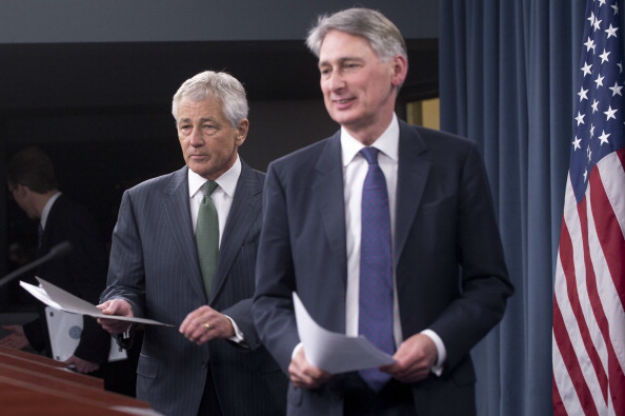
From Philip Hammond, E-Ring: The further east you go, the more of the concern remains that we should be prepared for a — maybe not full-blown state-on-state conflict — but we need to be prepared to protect the borders of NATO against incursions, probings, mischief-making, ethnic trouble.
If you go to Poland, for example — you probably in your daily life are not focused on the Kaliningrad enclave — but if you go to Poland to talk about defense, the Kaliningrad enclave is the number one issue on the Polish agenda. So I think we have to recognize that many of the Eastern European partners joined NATO as an insurance policy against Russia, and now they are slightly alarmed at seeing NATO turning away from Russia to focus on other threats, including asymmetric threats.
So there’s definitely not a single European view of this. But the further away you get from Russia — so this is not just an East European/West European question. The Norwegians are closer to the Poles’ thinking than they are on our thinking on this. But the further away you get, and certainly by the time you get to the U.K., the idea that somehow we need to configure ourselves to be dealing with the Russian threat doesn’t feel very real to public opinion. Although, of course at a strategic level, the Russians do still pose the most credible potential threat. . . .
it is clear that when we talk about how we configure European NATO defense, we have to be clear what we’re trying to defend against — where the threat is coming from. Certainly among most NATO countries, we see the most immediate threat being from North Africa, the Horn of Africa, the Middle East region and delivered in the form of an asymmetric threat, terrorist-based threat, rather than state-on-state warfare. Although, Libya, Syria, Iran are reminders state actors can have an important role to play.
So, I think it’s wrong to think about the debate in Europe as whether we put more troops in Europe to replace U.S. troops being taken out of Europe. The debate we should be having is whether European NATO is prepared to extend its focus of operations into an area where traditionally the Americans have led — in the Middle East, Near East, Horn of Africa, North Africa.
And there are some political challenges. Britain and France recognize this demand and recognize our responsibilities in those regions. There will be some issues, some challenges where U.S. leadership is always required — Iran, Syria. There will be others — Mali, for example — where it is possible for the Europeans to do things without active U.S. engagements. Certainly without U.S. leadership.
But we also have to recognize that some of the European partners are not yet at the point where they can embrace this agenda for political reasons — most obviously Germany. The idea of — NATO is well established in the German public’s mind, and well understood and well accepted. But as we move NATO to look more like the basis of expeditionary forces into areas like North Africa, Horn of Africa, this becomes much more difficult for some of the allies.
And this is not a static position. Germany’s government position has evolved dramatically over the last 20 years. I mean, if you had said 20 years ago the Germans would have 1,000 troops dug in, in the middle of Central Asia somewhere conducting combat operations, nobody would have even believed that was even conceivable, and yet now it’s — I won’t say it’s popular in Germany but it’s accepted by the German public that Germany has to engage in these types of operations. But this is work in progress, it may take another 20 years to get Germany to the place where we’d ideally like it to be.
Excerpts from interview of British Defense Secretary Philip Hammond by Kevin Baron, FP National Security. (photo: Saul Loeb/AFP/Getty)
Image: getty%205%203%2013%20Hagel%20Hammond.jpg
